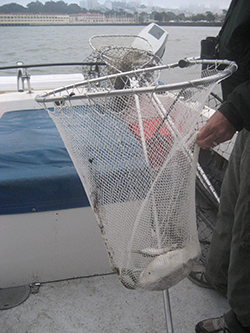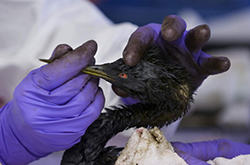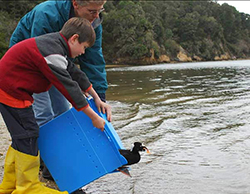
Staff and volunteers of the Oiled Wildlife Care Network, managed by UC Davis, capture oiled wildlife using nets.

Staff of the Oiled Wildlife Care Network examine a bird collected from the Nov 7 2007 oil spill in San Francisco Bay.

Staff and volunteers of the Oiled Wildlife Care Network wash oil from a bird.

Staff and volunteers release rehabilitated wildlife.
Scientists from the California Department of Fish and Wildlife (CDFW) and University of California, Davis have published an opinion essay that advocates rehabilitation and release, rather than euthanization, of animals injured by oil spills. The essay, entitled “Life and Death: How Should We Respond to Oiled Wildlife?” can be found in the June 2018 issue of the Journal of Fish and Wildlife Management.
CDFW Environmental Scientist Laird Henkel and Dr. Michael Ziccardi, director of the Oiled Wildlife Care Network at the UC Davis School of Veterinary Medicine, argue that a coordinated effort to attempt rehabilitation of oiled wildlife is warranted on scientific, financial and ethical grounds.
Efforts to clean birds and mammals oiled by spills are not only publicly expected in California, but also mandated by laws enacted in the early 1990s. However, some critics have argued that rehabilitation is a waste of resources and that the most responsible action is to immediately euthanize impacted animals.
In their paper, Henkel and Ziccardi cite scientific studies that show oiled animals often survive just as well as non-oiled control animals, and that euthanasia should only be considered for animals unlikely to return to normal function after rehabilitation.
The scientists assert that the costs for wildlife rehabilitation are typically a very small portion of overall oil spill response costs. Costs are also typically independent of post-spill funds secured to restore impacted natural resources — the cost of cleaning wildlife does not reduce the post-spill restoration work.
From an ethical standpoint, Henkel and Ziccardi note that some people consider individual animals to have intrinsic value, and that as consumers of petroleum products, we have an obligation to reduce suffering and mitigate injuries from spills associated with the production, distribution, and use of petroleum products.
The scientists cite public safety and legal issues as additional rationale for rehabilitation. They contend that members of the public, untrained to care for animals, will attempt to help oiled animals on their own if professional organizations do not. They further assert that legislation protecting the environment is often catalyzed by public outrage over seeing oiled wildlife.
The essay can be found online at the  Journal of Fish and Wildlife Management website.
Journal of Fish and Wildlife Management website.
For more information on oiled wildlife rehabilitation in California, visit the  Oiled Wildlife Care Network, or CDFW’s Office of Spill Prevention and Response.
Oiled Wildlife Care Network, or CDFW’s Office of Spill Prevention and Response.
All photos courtesy of University of California, Davis. Cover: One of many oiled ducks being soaped and treated.